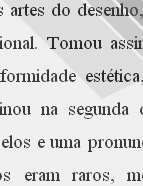

................................
In addition to the references in As Farpas [Barbs] (1871-1882), he published around three dozen texts in newspapers, journals and catalogues, namely: "Cifka" (1879), "O concurso de pintura na Academia de Belas-Artes" ["The painting competition at the Academy of Fine Arts"] (1879), "Silva Porto" (1879 and 1895), "Carolus Duran, Silva Porto e Columbano" ["Carolus Duran, Silva Porto and Columbano"] (1880), "A exposição de quadros – Alberto de Oliveira” [“The exhibition of paintings - Alberto de Oliveira"] (1883), "Na morte de Miguel Lupi” [“On the Death of Miguel Lupi"] (1883), "A Pintura Moderna em Lisboa” [“Modern Painting in Lisbon"] (1883-84), "As louças de Bordalo Pinheiro” [“Bordalo Pinheiro's Earthenware"] (1886), "A obra de Ventura Terra” [“The Work of Ventura Terra"] (1903), "Soares dos Reis" (1904) and "A Pintura de Malhoa” [“The Painting of Malhoa"] (1906). The writer Fialho de Almeida (Vila de Frades, 1857 - Cuba, 1911) embraced criticism mainly in the last twenty years of his life, in chronicles collected in Os Gatos [Cats] (1889-1904), Vida Irónica [Ironic Life] (1892), À Esquina [On the corner] (1903), Barbear, Pentear [Shaving and Combing] (1911) and Vida Errante [Aimless Life] (1925). Ribeiro Artur (Lisbon, 1851 - 1910) was, in professional terms, a military man. He reached the rank of lieutenant-colonel of infantry, wrote instruction manuals, and wrote the history of the "Portuguese hunters in the Peninsular War". However, he devoted himself mainly to watercolour painting, displaying his works at the Grémio Artístico [Art Guild], the Sociedade Nacional de Belas-Artes [National Society of Fine Arts] and at the 1900 Universal Exhibition in Paris. His expressive critical work was compiled in three volumes entitled Arte e Artistas Contemporâneos [Contemporary Art and Artists] (1896, 1898 and 1903). Evaristo Cândido Monteiro Ramalho (Barqueiros, Mesão Frio, 1862 - 1949), a journalist and writer who was a member of the Grupo do Leão [Leão [Brewery] Group], collected his critical work in Folhas de Arte [Art Sheets] (1897). Jaime Batalha Reis (Lisbon, 1847 - Torres Vedras, 1933), a graduate in Agronomy, a journalist and diplomat, member of the Geração de 70 [1870s Generation], was interested in theoretical issues and in criticism on painting. One of the best expressions of 19th century art criticism was the book that António Arroio (Porto, 1856 - Lisbon, 1934), a public works engineer and education inspector, dedicated to Soares dos Reis and Teixeira Lopes in 1899, entitled " Estudo crítico da obra dos dois escultores portugueses, precedido de pontos de vista estético” [“Critical study of the work of the two Portuguese sculptors, preceded by aesthetic points of view"]. This author, who directed the Portuguese representation at the 1900 Universal Exhibition in Paris, wrote extensively on music.
